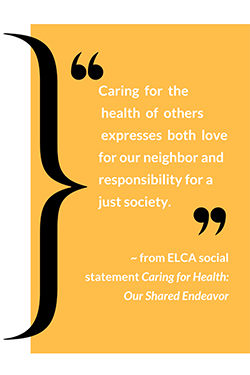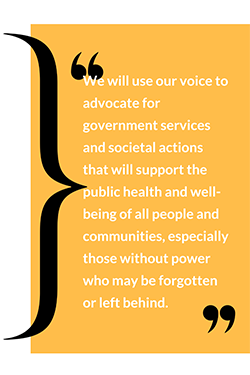With daily developments in the spread and scope of the coronavirus disease 2019 (COVID-19), our anxiety and uncertainty tempt us to curve inward and fixate on self-preservation. Appropriately, ELCA congregations and ministries are responding to the outbreak in their communities to ensure the health and safety of worshipers, staff and neighbors by adopting practices to slow transmission of COVID-19. Resources and links on ELCA.org/publichealth offer guidance to inform and prepare our worshiping communities. But as church in this pandemic, we can also shine a light on impacts for our most vulnerable neighbors. God calls us to stand by them in advocacy for dignity, equity and justice.
As a church for the sake of the world, committed to God’s call to love and serve our neighbor, we must turn our attention to those who will be most impacted by what may be massive disruptions. The probability of lockdowns, quarantines, and intensified health and safety precautions is growing. From employment and income to government services, from access to testing and emergency health care to schooling for students, disarray can cause hardship.
 Our heightened concern extends to neighbors, including:
Our heightened concern extends to neighbors, including:
- The elderly and those in fragile health.
- First-line health care workers under stress as they meet unprecedented demand.
- The poor, people in low-wealth communities and workers in the gig economy, facing risks that include no paid sick leave, unavailable childcare, inadequate health care or lack of a savings cushion.
- The unhoused who have few choices for protecting shelter or health care access.
- Immigrants, mothers, fathers, daughters, sons and children in detention centers that are crowded and lack sanitary conditions.
- People who are incarcerated, with no access or options to appropriate prevention or care.
- Indigenous community and village residents, especially if they live in isolated areas where health care and infrastructure may not have immediate resources to respond to a large-scale crisis.
Last week, Congress passed emergency funding to fund local, state and federal governments’ public health response to the virus. This is an important first step, but we must do more so that our nation’s health care and economic systems work together to minimize impacts on poor and low-wealth communities, the elderly and other vulnerable people.
We call on Congress to strengthen programs that serve as an economic backstop for individuals and families. In doing so, we can help prevent unnecessary harm to communities and the nation-at-large, especially in vulnerable populations who may be overlooked.
Social teaching
ELCA social teaching understands that caring for health is a shared endeavor among individuals, government and the wider society that “expresses both love for our neighbor and responsibility for a just society” (“Caring for Health: Our Shared Endeavor”). We must be faithful stewards of our own health, but that is not all. “The Church also supports the just obligations of a society to serve those who are often left out and to be present with those who suffer” (page 9).
At this moment of global crisis, God calls the church to promote the health of and ensure care for those who suffer during this pandemic and their loved ones. We will use our voice to advocate for government services and societal actions that will support the public health and well-being of all people and communities, especially those without power who may be forgotten or left behind.
Policy points
To achieve these ends, ELCA Advocacy will prioritize policy points with the administration and on Capitol Hill to help our nation respond compassionately to the most impacted. The ELCA Advocacy network will be invited to act* when there are opportunities for our collective voice to make a difference. Areas being monitored include:
 Funding for testing and treatment for the underinsured and uninsured so health access for individuals is not financially prohibitive, and health care providers and hospitals can focus on treatment.
Funding for testing and treatment for the underinsured and uninsured so health access for individuals is not financially prohibitive, and health care providers and hospitals can focus on treatment.- Access to food and nutrition programs, which will be essential for the most vulnerable people to feed their families and maintain health, especially if movement is restricted or they fall ill. Important measures include ensuring continuation of school meal programs if schools are closed and addressing campus hunger, services on tribal lands, delivery of food to the elderly and access to food in rural areas.
- Housing assistance for the homeless or those at risk of losing their homes will ease the process of tracking and treating the sick and in doing so help reduce infections. Shelter system expansion that allows for safe distancing and personal hygiene will help protect the unhoused.
- Proper care and medical services for detainees in government custody is essential.
- Awareness that fears could prohibit beneficial public health access at entry points for migrants living in our communities is relevant. Screening and health care without fear of a documentation litmus test or detention should be emphasized in sensitive locations for individual and community wellness.
- Global health systems may be quickly overwhelmed, reducing ability to prevent transmission and provide health care to those who might acquire COVID-19. The ELCA can walk with global partners to advocate with the U.S. Congress for global public health resources to address international needs.
- Xenophobic harassment and attacks are on the rise at this time of heightened uncertainty. The church must lead in denouncing stigmatism and displays of racism by modeling welcome and inclusion and disseminating accurate information.
Our life together
In our civic engagement:
- Voting remains critical, and measures must be taken to ensure access to the ballot and election integrity during the increased risk due to COVID-19.
 Early voting, mail-in and other methods may be increasingly attractive options, and adjustment to registration methods may be advisable.
Early voting, mail-in and other methods may be increasingly attractive options, and adjustment to registration methods may be advisable. - As Census 2020 gets underway, congregations can use ELCA Census materials to encourage participation through online and paper formats so door-to-door census worker visits are kept to a minimum
Learning from this experience includes pointing to underlying policy decisions that better equip us to handle the unexpected, which will require improved policy.
- Infrastructure — multiuse medical facilities are needed in times of crisis.
- Food access — rural communities and other food deserts have unique challenges.
- Unemployment benefits — policy should be shaped to respond to such unexpected and urgent economic disruptions.
- Mental health needs — the body of knowledge on the long-lasting impact of traumatic events needs to increase.
Spiritual support, prayer and accompaniment by God’s faithful is needed to provide for those children and adults experiencing anxiety during this crisis, including witness to the healing work of God. Health care workers in particular may be in need of witness to God’s healing and presence as they tend to the growing and perhaps overwhelming number of sick.
——–
A prayer for caregivers and others who support the sick
God, our refuge in strength, our present help in time of trouble, care for those who tend the needs of the sick. Strengthen them in body and spirit. Refresh them when weary; console them when anxious; comfort them in grief; and hearten them in discouragement. Be with us all and give us peace at all times and in every way; through Christ our peace. Amen (Evangelical Lutheran Worship, page 85).
* Receive updates and Action Alerts from ELCA Advocacy by signing up at ELCA.org/advocacy/signup,
and connect on social media @ELCAadvocacy.
